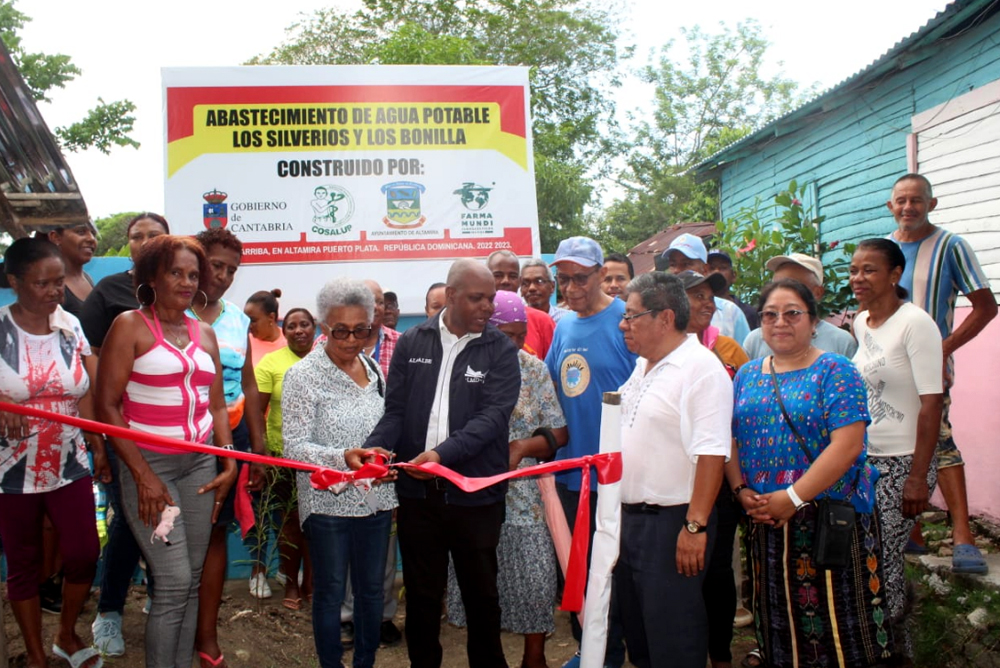A drinking water tank and the transformation of a community
It takes at least three hours to cross the Dominican Republic from south to north to reach the town of Bajabonico Arriba, Altamira, Puerto Plata, from Santo Domingo, its capital, on a 205-kilometer journey.
"The community of Bajabonico Arriba is located in the middle basin of the Bajabonico River. This is the river through which the Castilian conquerors invaded the Greater Antilles in 1492. It is a river that, as a result of the land use policy in the Dominican Republic, its upper basin is being deforested and there is a shortage of water. The river has lost much of its forests because having been a coffee-growing area in the past, now it has been converted into a cattle and tourist area, it has been drying up and there are many difficulties in the area of Puerto Plata where most of the people live from tourism. In the rural area there are problems for agricultural production due to the lack of rain and deforestation. When it rains, the river drags all the organic matter to the sea, so this has impoverished the area, making production and health precarious. The river used to be a source of life and now it produces pain and suffering. When it rains it overflows and washes away everything it finds, including homes, schools, police facilities and small businesses," describes Dr. Prásedez Polanco, president of the Dominican Republic's COSALUP Popular Health Collective.
It was in this community where, thanks to the joint efforts of civil society, local public administration, international cooperation and community participation, a tank was inaugurated on May 19 for the storage of drinking water and its distribution to homes through a rural aqueduct with a capacity for 240 families. The event was attended by an international delegation composed of María Hamlin Zúñiga, Hugo Icú and Karina Chalí from the Regional Community Health Promotion Committee (CRPSC) of the People's Health Movement (PHM) in Mesoamerica and the Caribbean; Román Vega, Global Coordinator of the PHM Movement; the mayor of Altamira, Mr. Adalberto Ramírez; Ms. Fermina García Trejo and Pràsedez Polanco, directors of COSALUP, and other people representing the communities of Los Bonilla, Los Silverio, Rincón and Bajabonico Arriba, and the Atabales Grayumbo Cultural Group.
"An action like this contributes to improve the quality of life of a community, it has an impact on people's health, that is part of the spirit of Primary Health Care, which is not only to treat the disease but to prevent it and transform the conditions that determine it," said Román Vega, Global Coordinator of the MSP to which Polanco added: "a project like this comes to improve the health conditions of this community and especially to improve the workload of women who are the ones who have to fetch water and carry it to their homes."
This community aqueduct was made possible thanks to the financial contributions of the Government of Cantabria and Farmacéuticos Mundi (FARMUNDI) of Spain, to the Mayor's Office of Altamira on behalf of its Mayor Adalberto Ramírez for having identified the need for the work to the work of organizations such as COSALUP. This event was part of the agenda of the Regional Meeting of Mesoamerica and the Caribbean for the Transformation and Refoundation of Health Systems that was held from May 16 to 18, 2023 at the facilities of the Instituto Social Colectivo de Salud Popular (COSALUP), in the Municipality of Santo Domingo Oeste, Dominican Republic.
The Regional Meeting is part of the political, strategic, thematic and organizational preparation activities for the 5th World Assembly for People's Health to be held in the City of Cali - Colombia from December 4 to 8, 2023, and of the campaign for the transformation of health systems promoted by the PHM in Latin America and the Caribbean.


